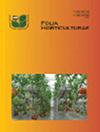Foliar application of potassium silicate, potassium fulvate and betaine improve summer-time tomato yield by promoting plant nitrogen and potassium uptake
IF 1.8
4区 农林科学
Q2 HORTICULTURE
引用次数: 4
Abstract
Abstract During the summer months, greenhouse tomato production is challenged by the heat, causing yield reduction; therefore, we conducted a study to test the effectiveness of different foliar spray compositions for the improvement of Lycopersicon esculentum var. cerasiforme ‘Qianxi’ nutrition uptake and fruit yield. Two forms of silicon, two kinds of organic nitrogenous compounds and water as the control factor were two-two paired to become nine different recipes, which were as follows: CK (H2O), ISi (K2SiO3), organic silicon (OSi), potassium fulvate (BSFA), BSFA + ISi, BSFA + OSi, betaine (GB), GB + ISi and GB + OSi. The plants were sprayed three times during the period of the first, second and third truss fruit expansions with a 2-week interval. As a result, BSFA or K2SiO3 generated higher yield in plants compared with the other compositions. Also, K2SiO3 significantly enhanced the total nitrogen, phosphorus and potassium accumulation in fruit and the whole plant. Comparing across the nine recipes, BSFA + ISi, ISi and GB had improved the fruit yield by 17%, 12.7% and 9.5%, performing the best. BSFA + ISi, ISi and GB also improved the plant nitrogen uptake by 8.2%, 18.8% and 9.8%, as well as the potassium uptake by 16.2%, 12.3% and 15.2%, compared with CK, respectively. Thus, K2SiO3, BSFA and GB stimulated the plant nitrogen and potassium uptake, which improved the marketable yield.叶面施用硅酸钾、黄酸钾和甜菜碱通过促进植株对氮和钾的吸收来提高夏季番茄产量
摘要在夏季,温室番茄生产受到高温的挑战,导致产量下降;因此,我们进行了一项研究,以测试不同的叶面喷雾成分对改善黔西番茄营养吸收和果实产量的有效性。以两种形态的硅、两种有机含氮化合物和水为控制因子,将其两两配对,形成9种不同的配方,分别为:CK(H2O)、ISi(K2SiO3)、有机硅(OSi)、黄酸钾(BSFA)、BSFA+ISi、BSFA+OSi、甜菜碱(GB)、GB+ISi和GB+OSi。在第一次、第二次和第三次特拉斯果实膨胀期间,以2周的间隔对植物进行三次喷雾。结果,与其他组合物相比,BSFA或K2SiO3在植物中产生更高的产量。K2SiO3显著提高了果实和全株总氮、磷、钾的积累。在9个配方中,BSFA+ISi、ISi和GB的果实产量分别提高了17%、12.7%和9.5%,表现最好。与对照相比,BSFA+ISi、ISi和GB也分别提高了植物对氮的吸收8.2%、18.8%和9.8%,对钾的吸收16.2%、12.3%和15.2%。因此,K2SiO3、BSFA和GB刺激了植物对氮和钾的吸收,提高了商品产量。
本文章由计算机程序翻译,如有差异,请以英文原文为准。
求助全文
约1分钟内获得全文
求助全文
来源期刊

Folia Horticulturae
Agricultural and Biological Sciences-Horticulture
CiteScore
3.40
自引率
0.00%
发文量
13
审稿时长
16 weeks
期刊介绍:
Folia Horticulturae is an international, scientific journal published in English. It covers a broad research spectrum of aspects related to horticultural science that are of interest to a wide scientific community and have an impact on progress in both basic and applied research carried out with the use of horticultural crops and their products. The journal’s aim is to disseminate recent findings and serve as a forum for presenting views as well as for discussing important problems and prospects of modern horticulture, particularly in relation to sustainable production of high yield and quality of horticultural products, including their impact on human health.
 求助内容:
求助内容: 应助结果提醒方式:
应助结果提醒方式:


